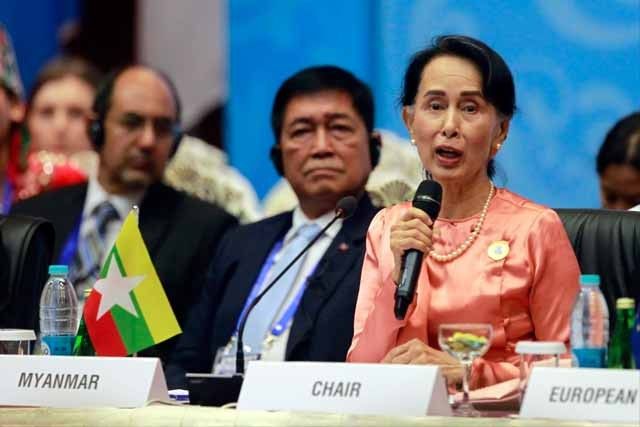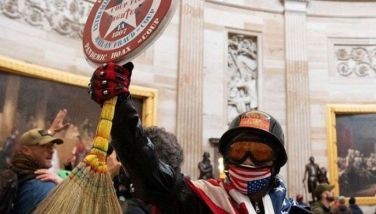Myanmar trial set to begin for 2 Reuters journalists
January 9, 2018 | 9:20am

Myanmar Foreign Minister Aung San Suu Kyi, right, speaks during the Asia Europe Foreign Ministers (ASEM) meeting at Myanmar International Convention Centre Monday, Nov. 20, 2017, in Naypyitaw, Myanmar.
AP / Aung Shine Oo
BANGKOK — Myanmar is set to put two reporters from the Reuters news agency on trial this week after they were charged under a colonial-era state secrets act, in a case that highlights growing concerns about press freedom in the country.
Wa Lone and Kyaw Soe Oo were arrested Dec. 12 for allegedly acquiring "important secret papers" from two police officers. The officers had worked in Rakhine state, where abuses widely blamed on Myanmar's military have driven hundreds of thousands of Rohingya Muslims to flee into neighboring Bangladesh.
The charges against the two are punishable by up to 14 years in prison.
Rights and media groups have criticized Myanmar's new civilian government led by Nobel Peace laureate Aung San Suu Kyi for continuing to use colonial-era laws to threaten and imprison journalists. Such laws were widely used by the military junta that previously ruled the country to muzzle critics and the media.
Under the current government, at least 32 journalists have been charged, mostly under colonial-era laws, according to the local group We Support Journalists.
"Such arrests and laws were widely used by the military junta to shut us down," the group's founder, Maung Saungkha, said by phone. "But it's sad to see media freedom is even worse under the so-called democratically elected government."
The arrest of the two Myanmar journalists, whose trial begins Wednesday, caused an international outcry. After they were detained, U.N. Secretary-General Antonio Guterres said the arrests showed how press freedom was deteriorating in Myanmar, while U.S. Secretary of State Rex Tillerson called for their immediate release.
Reuters President and Editor-in-Chief Stephen J. Adler also has called on Myanmar to free the journalists.
"Their arrest and continued incarceration represent an egregious attack on press freedom — preventing them, and deterring other journalists, from reporting independently in Myanmar," Adler said in a statement Monday.
Critics and rights groups say that in some respects, press freedom in Myanmar is more restrictive now than it was during the previous quasi-civilian administration, which bridged the former military government to the current civilian one. Suu Kyi's government, which has been in power for two years, has done nothing to change laws that create barriers to a free press.
"Nearly two years later, we have been gravely disappointed by the lack of progress on legal reform and the new clampdown on journalists under Suu Kyi's rule," said Shawn Crispin, senior Southeast Asia representative for the New York-based Committee to Protect Journalists.
In November, Myanmar authorities sentenced two foreign journalists working for Turkish state broadcaster TRT, along with their local interpreter and driver, to two months in prison for flying a drone over the parliament building. All four were released in late December.
A few days after the Reuters journalists were arrested, Myanmar President Htin Kyaw, a close ally and confidant of Suu Kyi, the country's de facto leader, authorized police to proceed with the charges against them.
Despite facing heavy criticism for the move, the government said it was simply implementing the rule of law.
"It's up to the court to decide whether the journalists are guilty or not because as a government, we don't interfere in the country's judicial system," said government spokesman Zaw Htay.
Wa Lone, who joined Reuters in June 2016, has covered a range of stories related to the Rohingya crisis, while Kyaw Soe Oo began working for the news agency in September. Since their arrest, they've been held in the country's notorious Insein prison.
More than 650,000 Rohingya have fled from Myanmar into Bangladesh since Aug. 25, when Myanmar's army began what it called "clearance operations" following an attack on police posts by Rohingya insurgents. The aid group Doctors Without Borders estimates at least 6,700 Rohingya civilians were killed in the first month of the crackdown.
Since the crisis in northern Rakhine state began, new restrictions on press access have made it nearly impossible for journalists to cover independently in the region.
"Suu Kyi's government clearly feels foreign media coverage of the Rohingya crisis has damaged its international image and now it's fighting back through bogus legal threats and jailing of journalists," Crispin said.
BrandSpace Articles
<
>
- Latest
- Trending
Trending
Latest
Trending
Latest
Recommended

































